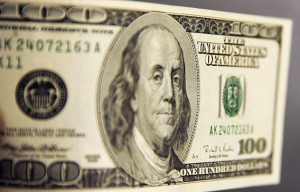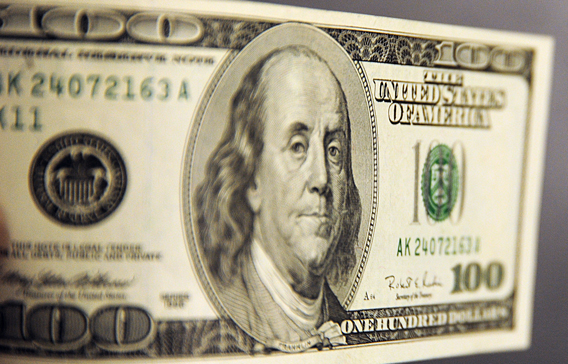
(AFP photo)
Money exchanges expect an increase in the dollar exchange rate against the Egyptian pound this week to exceed EGP 7.8. This came after the Central Bank of Egypt (CBE) sold a bid on Thursday worth $40m, at a rate of EGP 7.63.
Money exchange owners attributed the dollar price to the demand on the US currency in the last few days, especially from importers and bank investors who were unable to provide dollars.
“We expected the dollar exchange rate to rise in Ramadan to EGP 7.75, and it indeed did, due to the banks’ inability to meet the demands of investors as well as importers,” an official at Abramco Exchange said. The official added that the dollar will keep rising to EGP 7.8 and will stay stable at this rate.
The reason behind this inability is the recent CBE policy to put a maximum of $10,000 for deposit daily, and $50,000 monthly. This pushed companies to acquire global depository receipts (GDR), according to the Abramco Exchange official.
CBE sold $40,000 of the periodic dollar bid with an average price of EGP 7.63,after four months of stability. This came following the government’s decrease for the Egyptian pound exchange rate against the dollar at the start of 2015.
The government lowered the Egyptian pound’s exchange value against the dollar from EGP 7.18 to EGP 7.53 at the beginning of February. The move came in light of its policy to unify the formal and informal dollar exchange rate.
The CBE aims at increasing dollar availability in the market to fulfil the needs of companies, investors, and importers for hard currency, according to Belal Khalil, Deputy Head of the Exchange Division at the Federation of Egyptian Chambers of Commerce.
Although money exchanges expect the dollar rate to rise, Khalil does not expect a decrease in the Egyptian pound rate in the upcoming days. He said this is due to the increase of the dollar rate at the latest bid by CBE. “Let us wait to see the market conditions and CBE’s interventions,” he added.
He attributed this to CBE’s policy to put a maximum of $10,000 for deposits daily and $50,000 monthly, which will come in the way of the increase.
At the start of last week, Egyptian Stock Exchange (EGX) Chairman Mohamed Omran issued a decision to oblige Egyptian traders to acquire their dues from GDR outside Egypt through the local currency, instead of dollar.
The foreign reserve lost $1bn in May, although Egypt acquired $6bn from Saudi Arabia, the UAE, and Kuwait ($2bn from each country). The GCC money comes with an interest rate of 2.5%, with different terms from three to five years.
Despite the strict CBE supervision on money exchanges, there are still difficulties in providing foreign currency, especially the dollar. This, in return, will lead to an increase in its exchange rate to EGP 7.8 in the informal market, according to Mostafa El-Saeed, owner of Amon Exchange.
Through the CBE’s policy, the government plans to put restrictions on the informal dollar market and unify the price, as part of the International Monetary Fund’s (IMF) demand from the Egyptian economy in its report in February, added El-Saeed.




